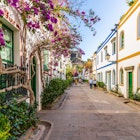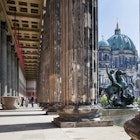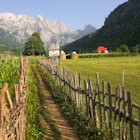

Choose which otherworldly and spectacular Cabo Verde island is right for you © Susana_Martins / Shutterstock
Marc is just back from Cabo Verde where he researched and wrote the upcoming Pocket Cabo Verde (out October 2024). Here he breaks down which island is best for your favorite type of vacation.
A sprinkling of volcanic islands almost 600km (373 miles) off the coast of Senegal, Cabo Verde is an archipelago that has it all: sweeping beaches of golden sand; active, climbable volcanoes; West Africa’s best hiking and a lively local music and arts scene.
This diversity means every island has its own unique charms, and traveling between them can be an unpredictable affair. We've got everything you need to know to choose the perfect Cabo Verde island for your vacation.
Sal: best for family beach holidays
By far the most touristed island, Sal is also the Cabo Verde destination with the most services, restaurants, excursions and bookable experiences. The epicentre of the tourist action is the town of Santa Maria, by far Cabo Verde’s biggest resort, with a world-class beach and more restaurants than most of the country’s islands put together.
When you’ve had enough of caipirinhas and sun lotion on the sands, take a day excursion with one of a multitude of local guides to some intriguing spots. Let baby lemon sharks nibble your toes in the shallows off the east coast, float Dead Sea-style at the salt pans of Pedra de Lume and spot turtles on the west coast – all easily manageable in a day.
Planning tip: There’s no need to book tours and excursions in advance. You can wait until you are on the ground to find the right guide for you.

Santiago: best for history and culture
Santiago is by far the most populated island in the archipelago and certainly has the liveliest feel. This is helped along by the fact that the Cabo Verdean capital, Praia, dominates the south coast. A short ride to the west of Praia lies Cabo Verde’s only UNESCO-listed site, Cidade Velha, once a major Portuguese colonial city that played a large part in the West African trade of enslaved people.
Today you can clamber around the ruins of cathedrals and monasteries or have a bite to eat in Cabo Verde’s oldest street, the aptly named Rua da Banana. Most head to Santo Antão for hiking, but Santiago has a network of marked trails that runs the entire length of the island as well as lots of associated infrastructure. Those trails reach a crescendo at Tarrafal, Santiago’s best beach resort with a truly Caribbean feel.
Planning tip: Many make the mistake of staying in Praia and taking trips north. Base yourself in the northern beach resort of Tarrafal for a much more pleasant experience.
Boa Vista: best for world-class beaches
Though divided from Sal to the north by a mere 40km (25 miles) of ocean, Boa Vista couldn’t be more different. Low-key and almost otherworldly, this is the island in the archipelago for those looking to escape, wander golden sands and dream of pirates and shipwrecks.
Sal Rei is the capital –a place with a lively expat scene and innovative new restaurants, such as Bowlavista, popping up regularly. With their cool bars and shimmering white sand, the town’s beaches would be enough for most islands, but just a short 4X4 journey away, Boa Vista really has some world beaters, such as endless Santa Monica and the dunes of Varandinha.
Speaking of dunes, Boa Vista has its own stretch of desert (the Viana), where the sand is piled up to 50m (164ft) high –a magical place to watch the stars at night and sandboard by day.
Planning tip: Boa Vista is best seen from the back of a 4X4 pickup, and the good news is there are plenty of local operators in Sal Rei willing to take you out to ride those dunes.

Santo Antão: best for hiking
Santo Antão is Cabo Verde’s Jekyll and Hyde island with two very different sides to it. Promotional bumf shows hikers passing through lush vegetation, but around two-thirds of the island is dry and barren. The third you’ll be interested in is the north, where you’ll find the Paúl Valley –arguably Cabo Verde’s top hike, with several routes passing through terraced farmland.
En route you can sample the local grogue, a sharp, rum-like concoction made in small distilleries along the valley from the sugar cane that thrives there. At the top of the valley, the O Curral restaurant is a superb place to replenish calories.
Planning tip: The only reliable ferry service in the entire archipelago operates between Mindelo on São Vicente and Porto Novo on Santo Antão. This makes these the only two islands you can safely plan to visit in one trip.
São Vicente: best for Cabo Verdean culture
This island is all about its capital, Mindelo, Cabo Verde’s second city and its most intriguing. World music fans will definitely know the name of singer Cesária Évora, Cabo Verde’s most famous daughter, who was born and died in Mindelo. Her legacy is a part of a cultural scene second to none in the east Atlantic, and that includes the country's top museum, the CNAD (National Centre for Arts, Craft and Design), which is packed with traditional handicrafts. But Mindelo is about more than just its jazz scene and art cafes. There’s a respectable beach to chill on, some great restaurants and the archipelago’s best fish market.
Planning tip: Mindelo is a place where it pays to go with the flow. There’s always something going on in town, from concerts to art shows, parties to street theater, so once you’ve unpacked, head out into the vibrant streets and let yourself be surprised.

Fogo and Brava: best for coffee and wine
Out in the far west of the archipelago, Fogo and Brava are an Atlantic double act with an off-the-map feel. The biggest draw here is the crater of the active volcano that gave birth to the island millions of years ago. Incredibly there are villages below the summit, which often get in the way of determined lava flows (last time in 2014).
The reason locals insist on living there is immediately clear – wine! Grapes love the volcanic soil in the caldera, and the local wine is special indeed. After sipping the local Chã das Caldeiras white, take a hike up the peak before boarding or sledging back down on the volcanic ash. That same volcanic soil also provides nutrients for coffee bushes, with plantations spread across the east of the island. Connoisseurs long since declared Fogo coffee one of the best beans in the world.
Brava is the most remote of Cabo Verde’s ten islands and feels like a true escape from 21st-century tourism. The beach village of Fajã de Agua on the west coast is a particularly dreamy place.
Planning tip: The timing of ferry services and absence of flights means you can’t make a day trip from Fogo to Brava, so you’ll need to book at least one night in a guesthouse on the tiny island.
Explore related stories









